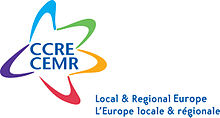Council of European Municipalities and Regions

CEMR logo
|
|
| Formation | 1951 |
|---|---|
| Type | Association |
| Location |
|
|
Membership
|
150,000 |
|
President
|
Iñigo Joaquín de la Serna Hernáiz |
|
Secretary General
|
Frédéric Vallier |
|
Staff
|
30 |
| Website | www |
The Council of European Municipalities and Regions (CEMR) is the largest organisation of local and regional governments in Europe. Its members are 55 national associations of towns, municipalities and regions from 41 countries that are part of the Council of Europe. Together these associations represent about 150,000 local and regional authorities.
At the head of its political structure is its president, currently the mayor of Santander, Iñigo de la Serna. It has a staff of about 30, headed by its secretary-general, Frédéric Vallier.
CEMR’s annual budget is about €2.5 million. Membership fees from its national associations make up the bulk of its funding. About 15% are paid by the European Commission through an annual grant.
The organisation has also assumed the function of the European section of the new worldwide organisation United Cities and Local Governments.
CEMR was founded in Geneva on 28 January 1951 by a group of European mayors as Council of European Municipalities (CEM). Regions were later allowed to join as well, hence the later name Council of European Municipalities and Regions.
Iñigo de la Serna, Mayor of Santander, has been elected President of CEMR in December 2015.
He is notably succeeding to :
CEMR's task is to promote a united Europe, based on locally and regionally autonomous government and democracy. To this end, it endeavours to shape the future of Europe by enhancing local and regional contributions, to influence European law and policy, to exchange experience at the local and regional levels and to cooperate with partners in other parts of the world. European legislation affects more than 60% of the policies implemented by cities, municipalities and regions. CEMR works together with its members to ensure that their interests are taken into account when European policy is being drafted.
CEMR is active in a number of political fields, including regional policy, transport, the environment, equal opportunities and governance. Its committees and working groups seek to influence draft EU legislation in order that the interests and concerns of local and regional authorities are taken into account from the earliest stages of the EU legislative process.
...
Wikipedia
